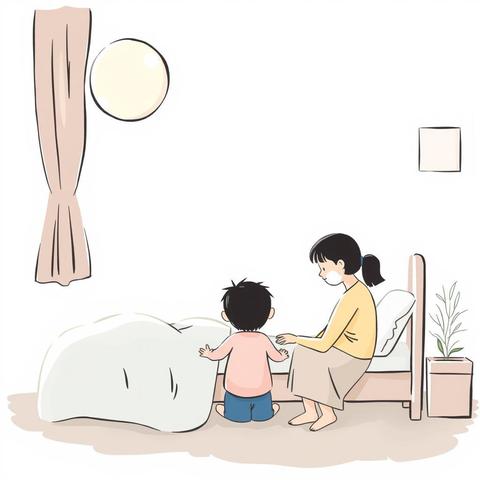Last night, I dreamt of my mother, her face etched with a stubbornness I’d never seen before, refusing any help for her ailing health. The image stayed with me, a heavy weight in my chest, prompting a flurry of questions: What does it mean when loved ones refuse help in our dreams? Is it a reflection of my own anxieties, or a message from the unconscious? This dream, like many others involving family and illness, speaks volumes about our deepest fears and unresolved conflicts. This article delves into the complex symbolism of dreams where family members refuse treatment, offering insights to help you understand the potential messages embedded within.
The Hidden Meanings Behind Family Refusal of Treatment in Dreams

Dreams, far from being random snippets of nighttime activity, are powerful windows into our subconscious minds. They offer a unique language, weaving together symbolism and emotion to reveal anxieties, unresolved conflicts, and suppressed desires. Dreaming of a family member refusing treatment often speaks to a sense of helplessness, frustration, or even guilt. It’s not necessarily a literal prediction of future events but a reflection of your inner emotional landscape.
The Role of Symbolism
The family member in your dream symbolizes a particular aspect of yourself or your relationship with that individual. Consider the specific family member involved. Is it a parent, sibling, or child? Each relationship carries its unique weight of emotional baggage and symbolic significance. For example:
- Parents: Often represent authority figures, nurturing aspects of your personality, or unresolved childhood issues. A parent refusing treatment may symbolize resistance to self-care, a fear of facing past traumas, or difficulty accepting help.
- Siblings: Represent competition, cooperation, or unresolved sibling rivalry. A sibling refusing treatment may suggest a struggle with personal responsibility, a need to assert independence, or underlying jealousy.
- Children: Symbolize your nurturing instincts, creativity, or vulnerabilities. A child refusing treatment may indicate anxieties about your ability to protect or nurture yourself or others.
The “refusal of treatment” itself symbolizes resistance to change, healing, or growth. It may represent your own reluctance to address a specific problem or emotional wound in your waking life. The type of illness in the dream also adds a layer of meaning. Cancer might symbolize a deep-seated fear or a feeling of being consumed by negativity. Heart disease could symbolize emotional blockage or a broken heart.
Common Variations and Themes
The interpretation shifts depending on the context and nuances within the dream. Let’s consider some variations:
- Dreams About Parents Being Sick: Unveiling the Hidden Messages
- Dreams About Terminal Illness in Family: Unpacking the Anxiety and Seeking Understanding
- Dreams About Losing a Family Member to Illness: Unraveling the Grief and Finding Peace
- Dreams About Misdiagnosis in Family Illness: Unveiling the Subconscious
- Dreams About Caring for a Sick Family Member: Unraveling the Emotional Landscape
- Argumentative Refusal: A heated argument surrounding the refusal of treatment suggests repressed anger, frustration, or unresolved conflict within the relationship. This may be a call to confront these issues in your waking life.
- Passive Refusal: A quiet, passive refusal suggests a more subtle resistance to change or self-care. This might be linked to feelings of denial, fear of vulnerability, or a reluctance to confront difficult emotions.
- The Dreamer’s Role: Your role in the dream—are you pleading with the family member, feeling helpless, or angry?—offers vital clues. Your emotional response reveals your subconscious attitude towards the issue. Feeling helpless suggests a sense of powerlessness in a particular situation, while anger could point to repressed resentment or frustration.
- The Setting: The location of the dream can also provide significant insights. A hospital setting may emphasize the seriousness of the issue, while a familiar home setting could reflect issues within your personal life.
The Interpretation and Deeper Message of Dreams About Family Refusing Treatment

These dreams are rarely about literal health issues; they are metaphorical representations of internal struggles. They urge you to examine these patterns and address underlying anxieties.
- Fear of vulnerability: Refusal of treatment can mirror your own resistance to seeking help or expressing your needs. It’s a sign to examine your own emotional resilience and explore the potential benefits of vulnerability.
- Unresolved family conflicts: Dreams often bring unresolved issues to the surface. Consider any existing conflicts or strained relationships in your family. The dream may be highlighting the need for reconciliation or communication.
- Resistance to change: The refusal of treatment can symbolize your own resistance to personal growth or necessary life changes. It’s a call to embrace change and step outside your comfort zone.
- Personal neglect: The dream may be a reminder to prioritize your own well-being. Are you neglecting your physical or mental health? Is there a part of yourself you’re avoiding?
Practical Advice for Dreamers

Understanding these complex dreams requires self-reflection and a willingness to explore your subconscious. Here are some practical steps:
- Keep a dream journal: Record your dreams immediately upon waking, noting details like emotions, settings, and individuals involved. This consistent practice will allow for deeper pattern recognition and self-analysis.
- Reflect on your emotions: Pay close attention to the emotions evoked by the dream. What feelings surfaced during the dream? How did you feel after waking up?
- Connect with your intuition: Trust your gut feeling about the dream’s meaning. What aspects resonated most strongly with you? What symbolic connections can you make with your waking life?
- Consider professional guidance: If you’re struggling to interpret your dream, consider seeking professional help from a dream therapist or counselor. A qualified therapist can provide tailored support and guidance in navigating your subconscious messages.
- Engage in self-care: Address any underlying issues highlighted by the dream through self-care practices like meditation, journaling, spending time in nature, or pursuing hobbies.
Addressing the Underlying Issues
The dreams about family members refusing treatment often point towards deeper emotional needs and unresolved issues within the dreamer’s own life. It’s crucial to understand that these dreams are not predictions of future events but symbolic representations of your inner world. By understanding the symbolism and exploring the possible interpretations, you can gain valuable insights into your own emotional landscape and work towards healing and personal growth.
- Identify the Root Cause: What specific anxieties or fears are surfacing through this dream? What is the family member symbolizing in your life? What aspect of yourself might be resisting help or change?
- Practice Self-Compassion: Approach this dream with self-compassion. Recognize that these feelings and anxieties are valid, and you don’t have to face them alone.
- Seek Support: Reach out to trusted friends, family members, or a mental health professional for support and guidance in navigating these challenging emotions.
Improving Sleep Quality: A Pathway to Clearer Dreams
Often, dream clarity and vividness are tied to sleep quality. Optimizing your sleep hygiene can significantly enhance your ability to recall and interpret your dreams:
- Establish a Consistent Sleep Schedule: Go to bed and wake up around the same time each day, even on weekends, to regulate your body’s natural sleep-wake cycle.
- Create a Relaxing Bedtime Routine: Engage in calming activities before bed, such as reading, taking a warm bath, or listening to soothing music. Avoid screens for at least an hour before bedtime.
- Optimize Your Sleep Environment: Make sure your bedroom is dark, quiet, and cool. Invest in comfortable bedding and consider using earplugs or an eye mask to block out distractions.
- Limit Caffeine and Alcohol Before Bed: These substances can interfere with sleep quality and lead to fragmented or less memorable dreams.
- Get Regular Exercise: Physical activity can improve sleep quality, but avoid intense workouts close to bedtime.
Dream Therapy: A Path to Self-Discovery
At Dream Therapy Now, we understand the power of dreams in fostering self-awareness and personal growth. Our team of certified dream experts and therapists utilizes a range of techniques, including dream analysis, cognitive behavioral therapy (CBT), and mindfulness practices, to help individuals understand and work through their dreams. We offer a supportive and confidential environment where you can explore the deeper meanings of your dreams and uncover valuable insights into your subconscious mind. We are committed to guiding you on your journey towards better sleep and self-discovery. Contact us today to schedule a consultation.
Contact us:
- Address: 143 Horizon Dr, Bedford, NH 03110
- Email: info@dreamtherapynow.com
This journey of dream interpretation can be deeply enriching and empowering. By understanding the symbolic language of your dreams, you can unlock valuable insights about yourself, your relationships, and your life path. Embrace this opportunity for self-discovery, and let your dreams guide you towards a more fulfilling and meaningful existence. Remember, the messages within are personal and unique to you; trust your intuition and allow yourself the space to explore.
Dive into our blog to discover a wealth of content that will illuminate the significance of your nocturnal adventures and guide you through the labyrinth of dream symbolism. Impeccable Dream hopes this guide was helpful! If you want to see other blog posts about Dreams About Family Illness, here are some that may be of interest to you.